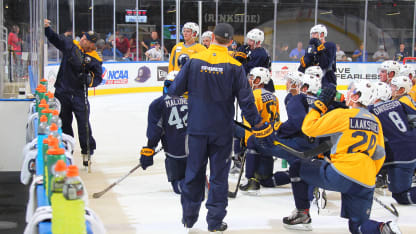In every phase of his hockey career, Jason Botterill has seen the fruits of development pay off.
There was, for starters, his time as a player with the Rochester Americans. He was a veteran on the team when players like Ryan Miller, Jason Pominville, Paul Gaustad and Derek Roy were being cultivated into future NHL regulars.
More recently he served as member of the front office in Pittsburgh, where he saw firsthand how success in Wilkes-Barre/Scranton helped equip young players to make the jump to the NHL and become major components of back-to-back Stanley Cup championships.
Camp offered first look at Sabres' approach to development

© Bill Wippert
So, on Day 1 of his job as general manager of the Buffalo Sabres, Botterill spoke of building two competitive teams - one in Buffalo and one in Rochester - while giving his mission statement.
"Developing an organization that's going to be year-in-and-year-out successful in the National Hockey League," he said, "you have to have that development in place."
But what would that look like? Botterill emphasized communication, both from coaches to players and from management to prospects. Instilling trust in young players would deepen their commitment to the organization.
We're now two months removed from that introductory press conference, and for four days at HarborCenter this past week, that vision began to materialize. The first summer development camp under Botterill's watch served not only as an introduction to several Sabres prospects, but also to the people he's put into place to guide the organization in its new direction.
A relentless pursuit of success
Randy Sexton says that rebuilding the Rochester Americans and helping to bring a Stanley Cup to Buffalo is what gets him out of bed in the morning with a bounce in his step. With the level of sincere enthusiasm in his voice, you can't help but believe him.
Sexton was brought on by Botterill as one of two assistant general managers, along with Steve Greeley, on June 26. Sexton will also serve as general manager of the Amerks, which is similar to the role Botterill held in Pittsburgh (he served as associate general manager for Pittsburgh and GM for Wilkes-Barre/Scranton).
Like Botterill, Sexton has previous experience in Rochester. He was general manager of the Amerks during the 2009-10 season, when the team was affiliated with the Florida Panthers.
"It's a wonderful hockey market," Sexton said. "We have an organization that needs some work, but we are not going to rest until we restore the Americans to what I think is their rightful place amongst the elite teams in the American Hockey League. It'll come one day at a time; it'll come one person at a time, but we will be relentless in our pursuit of that success."
Sexton has spent the last seven seasons working in the scouting department for the Penguins, the last four of which he served as director of amateur scouting. He walked away from Pittsburgh after two Stanley Cups because he saw an opportunity in Buffalo to build a team under ownership that will make every resource available and a GM with whom he's already comfortable.
"I would hope that I can be a sounding board on every level, both personal and professional," Sexton said. "We have a terrific relationship. It's open. It's candid. I have to catch myself calling him 'Bottsy' because the only time I ever really call him 'Jason' was when I'm angry with him. We have a great relationship. I know that in Pittsburgh, we talked a lot about a variety of subject matters and in a short period of time here, we've had similar conversations."
They also share a philosophy on winning at the AHL level.
"Some people think development means you go with a young team, you get your head caved in every night, you lose a lot of games and by God, the kids are learning," Sexton said. "We don't subscribe to that. We think that you need to surround these young players with quality veterans, character people that will show them the way, will show them how to be good pros.
"We need to surround them with a coaching staff and development staff that are going to push them every day to get better and better, but are also going to support them in the difficult times that they will have - because there are lots of difficult days in development."
With that in mind, Sexton searched for his coach.
An open door
Chris Taylor interviewed with Sexton twice, once for two-and-a-half hours and again for two more hours the following day. Taylor said it was a tough interview, but he managed to make quite the impression.
"When we look at Chris as a leader," Sexton began, "his ability to communicate, his ability to find the positive in everything, and his ability to treat each and every one of our young players as the individuals that they are - despite interviewing six or seven candidates, I just kept coming back to Bottsy saying, 'I think this is our guy.'"
On the surface, it looks like a perfect fit. Taylor was Botterill's teammate in Rochester for two-plus seasons, and spent last season as an assistant coach in Wilkes-Barre/Scranton. Botterill has said that he wants to bring people in who are proud to wear the logo; Taylor ranks fourth in Amerks history with 519 games played and was inducted into the team's Hall of Fame of 2015.
But Taylor's qualifications go deeper than his Rochester connections. Sexton points to his career path, which saw him play 617 games in the AHL and 149 in the NHL, as a testament to the adaptability that he can impart on young players.
"Very few players come into professional hockey and get to the NHL and play the same role that they played in junior or college," he said. "Chris was living proof of that. He was a prolific scorer in junior; he was a great offensive player in the American League, but in order to get NHL games, he had to play good defense. That in itself is a signal to our players, and young players who recognize that quickly in their career ascend to the NHL much quicker than those who fight it or don't."
Taylor also appears to fit the billing as the type of communicator that Botterill sought to lead his AHL team. He was an assistant coach in Rochester when Justin Bailey played his first professional season in 2015-16, and Bailey credited him with helping to ease the transition.
"Tayls is one of the coaches for me that was a big part of helping me transition to pro. I can say that with all honesty," Bailey said. "He was a big part of helping me to get through those early bumps and bruises in my pro career. Those first 15 games were tough. Getting me through those sticky periods and keeping in touch with him last season - just someone to talk to away from the rink, he's been amazing and he's really earned that head coaching job."
Even when Taylor was in Wilkes-Barre last season, Bailey would text him for advice.
"I'm there for everybody," Taylor said. "That's the way I am as a coach, even a head coach. My phone's on, they can call, text me any time. I don't want anybody going to bed thinking that they don't know something from me or that they can't sleep because they're thinking about something that we did or he thought he did. I want everybody to understand that I'm there for them and we'll try to help them out as much as possible.
"I think the trust level from the players to the coach has got to be there," he continued. "If there's no trust then they're not going to play for you, it's simple as that. I really believe that and I want them to feel comfortable, I want them to know where they stand. We'll tell them the truth all the time and we just want them to be comfortable."
#
'It starts with the young guys'
It took one day of camp for players to notice a change in the atmosphere under Taylor and the new staff. The energy was positive and the atmosphere was loose, which may be an indication of what's to come in Buffalo and Rochester.
"It's hockey. I think that's the most important thing, is it's a game still," Taylor said. "If you enjoy what you do at the rink, you're going to perform and you're going to want to do it. We don't want people uptight, you're holding the stick you can't make a pass, you're not talking to each other. We want everybody to know each other."
Botterill emphasized a focus on the person as much as the player when asked about his approach to drafting. That has held true in the early going; players who interviewed with the Sabres at the NHL Scouting Combine in Buffalo said the questions were mostly personality based, and the focus at development camp was as much about growing off the ice as it was on it.
"The on-ice is only one part," Sexton explained. "The more important part - and the part we're really watching for - is how do you handle yourself off the ice? How do you take advantage of all the incredible resources we have here to help you help yourself be better? That's really the focus of this camp. It's not about stops and starts or bag skates. It's about helping each of these young players access the resources they need to be as good as they're capable of becoming."
Housley's opening remarks to the prospect camp, too, focused on character and commitment.
"We want good people in this organization," he said. "But it's about putting the work in. Development, it takes a lot of work and everybody has a different path in the NHL. Whatever path they have, whatever destiny they have, just own it and continue to work on it. Some people get there quicker than others, but it doesn't mean that there's not a lot of great stories of perseverance in trying to get there."
The players, meanwhile, can look at Botterill and Sexton's track record in Pittsburgh and know that, if they earn it, they'll get their chance. Nicholas Baptiste, an elder statesman at this year's camp, pointed to Jake Guentzel as an example of that opportunity. Guentzel started last season in Wilkes-Barre, but joined the Penguins midway through season and was a key component to their Cup run. He posted 21 points (13+8) in 25 playoff games after recording 33 points (16+17) in 40 regular-season contests.
But Guentzel's success was in part a product of the people around him, too. Taylor credits Tom Kostopoulos, a longtime NHL veteran who's spent the past four seasons captaining Wilkes-Barre/Scranton, with providing a level of leadership that helped propel Pittsburgh's young players to make the jump.
To that end, Botterill added a group of five players on July 1 - headlined by Kevin Porter and Matt Tennyson - who will create competition for NHL roster spots and bring leadership should they end up in Rochester.
It's not all that different from the role Taylor and Botterill played as veterans with the Amerks all those years ago.
"We're just trying to create that culture right here at the start, getting these young guys," Taylor said. They're the future of how we're going to get out of where we're at. We hit on that with the young guys right at the start of camp, with Jason talking to them and Phil talking to everybody.
"I think it all starts with the young guys and we have to go from there."


















